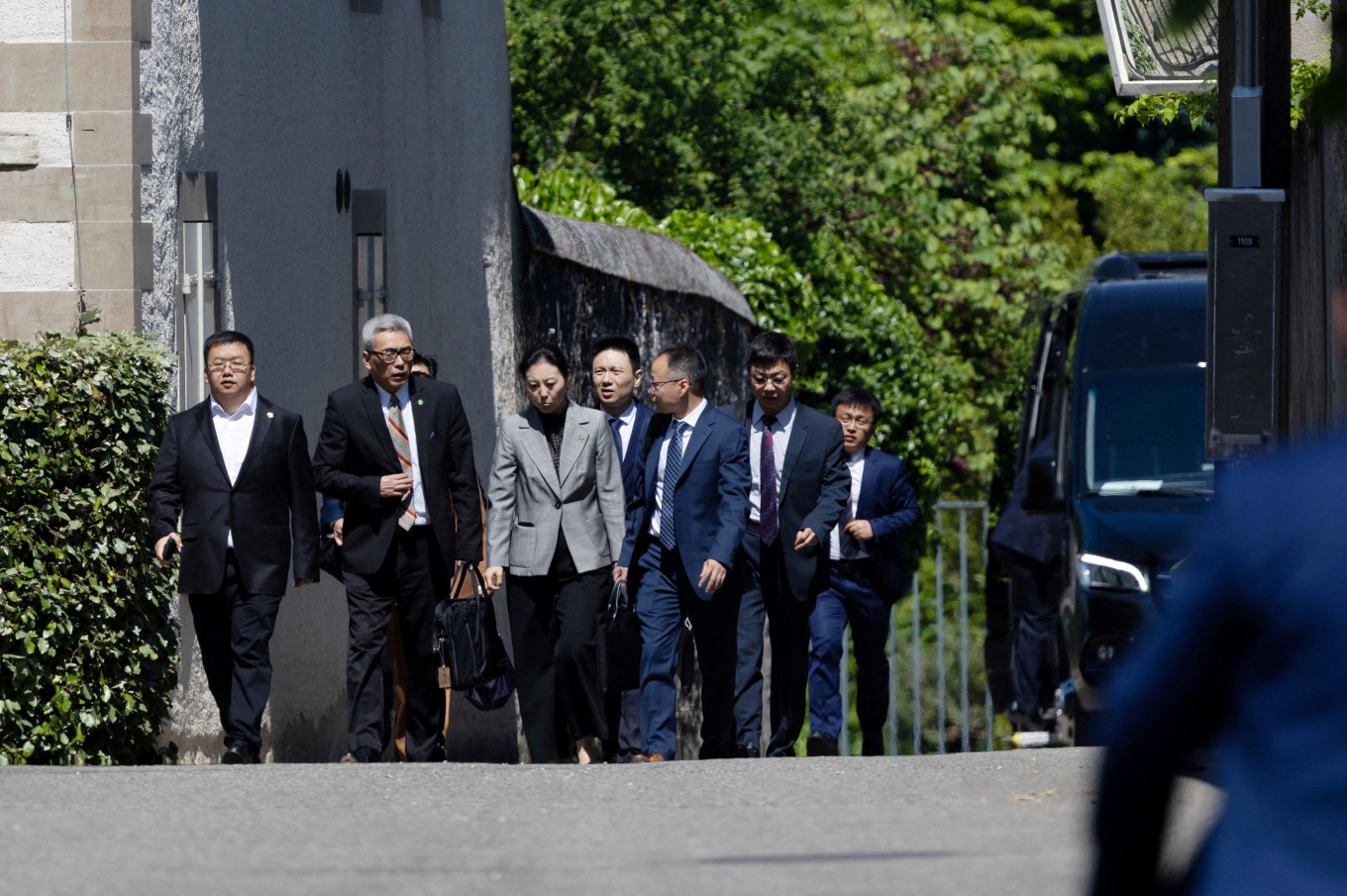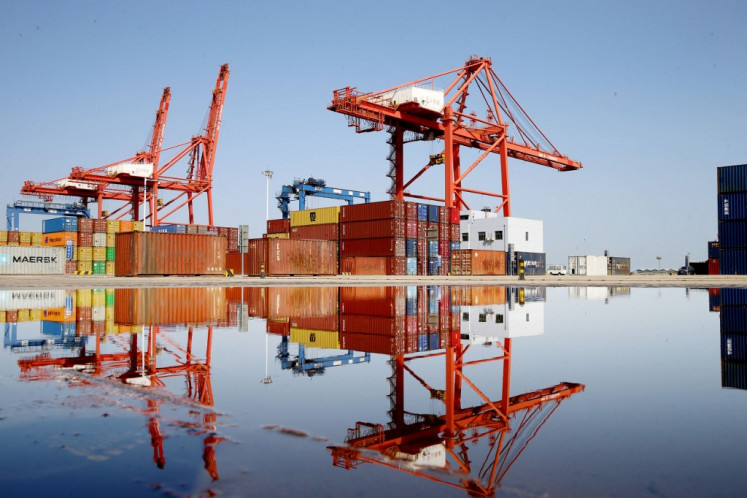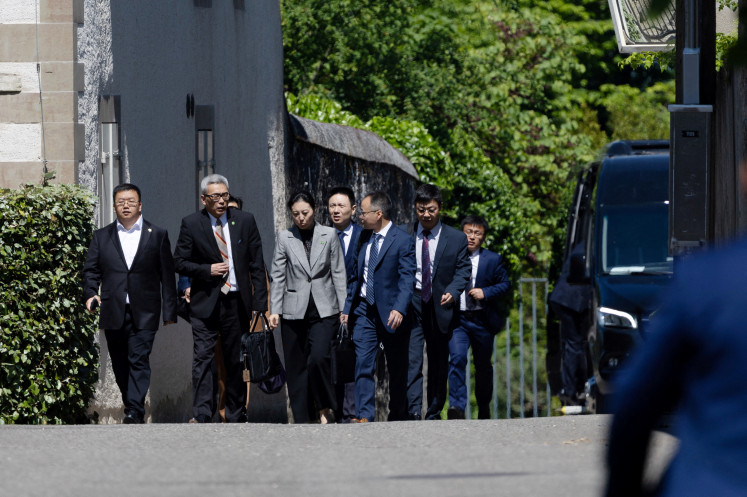Wary investors hope US-China talks cool high-stakes trade war
Change text size
Gift Premium Articles
to Anyone
 Members of the Chinese delegation leave a residence where trade talks between Chinese and US delegations take place in Geneva, Switzerland, on May 10, 2025. (Reuters/Denis Balibouse)
Members of the Chinese delegation leave a residence where trade talks between Chinese and US delegations take place in Geneva, Switzerland, on May 10, 2025. (Reuters/Denis Balibouse)
I
nvestors are hopeful that US-China trade talks this weekend will cool a trade war between the world's two largest economies and dispel some of the uncertainty clouding financial markets, though few expect a major breakthrough just yet.
The highly anticipated meeting in Switzerland could mark one of the biggest developments since US President Donald Trump launched sweeping tariffs on April 2, which threw the global trade landscape into chaos and set off extreme market volatility.
"This is the mother of all negotiations," said Alejo Czerwonko, chief investment officer, Emerging Markets Americas, at UBS.
"There are hundreds of billions of dollars of trade on the line, a 145 percent tariff on Chinese exports that amounts to some sort of de facto embargo and grievances that extend well beyond trade."
The US-China trade talks in Geneva had adjourned for the day and were set to continue on Sunday, a source familiar with the discussions told Reuters.
US President Donald Trump said late on Saturday that the two countries had negotiated "a total reset [...] in a friendly, but constructive, manner."
He added that "great progress" was made, without elaborating.
Recently, investors have expressed optimism that the worst-case trade scenarios would not come to pass, and pointed to signs of de-escalation between the US and China as a reason behind a rebound in equities.
But despite comments by Trump ahead of the talks suggesting a lower level of Chinese tariffs, and a trade deal announced on Thursday between the US and Britain, many market participants said they were not expecting major breakthroughs this weekend.
Rather, they confined themselves to hoping that nothing goes wrong when the two sides come face-to-face for the first formal round of what may be protracted negotiations.
"We're still doubtful that direct US-China negotiations will lead to a 'grand compromise'," said Thierry Wizman, global FX and rates strategist at Macquarie, in a note to clients.
IMMEDIATE PACT SEEN AS UNLIKELY
Both the US and China may want, or even need, to reach a deal, said Liqian Ren, director of Modern Alpha at WisdomTree Asset Management. At this early stage, however, there seems to be little incentive to do so rapidly, she added.
"Each still wants to see how the other side copes with negative headwinds," Ren said.
"Right now, the market is maybe a little bit too optimistic in terms of what China and the US can achieve and how fast events will move."
Trade tensions between the two nations escalated last month, when the US boosted tariffs on all Chinese imports to a whopping 145 percent, and China then raised levies on US imports to 125 percent.
On Friday, comments by Trump that an 80 percent tariff on Chinese goods "seems right" - making his first suggestion of a specific alternative to the 145 percent levies - created some hope of progress toward resolving the dispute.
The benchmark S&P 500 stock index has already erased the steep losses seen in the immediate aftermath of the tariff announcement on April 2, although businesses continue to warn investors of their impact, and the uncertainty they create, in earnings-related comments.
The S&P 500 remains down about 8 percent from its February all-time high and roughly 4 percent for the year.
Amid the tariff chaos, weak consumer sentiment surveys and other "soft data" have raised concerns about US growth, although most economic data have indicated resilience in the economy.
EYEING MARKET VOLATILITY
Volatility, meanwhile, remains. The Cboe Volatility Index, the options-based measure of investor anxiety, hovered around 22 late on Friday - well below its recent closing high of 52.33 in early April, but above its longer-term median of 17.6.
One of the factors curbing that volatility so far has been the high cost of establishing short positions betting on future market declines, said WisdomTree's Ren.
"When a single [social media post] from the president can make the market move 10 percent, it becomes very costly" to establish those positions, Ren said. Equities soared on April 9 after Trump paused many of the heftiest tariffs for 90 days.
Still, markets were poised for more volatility ahead, said Matt Gertken, head of geopolitical strategy at BCA, a macroeconomic investment research firm.
Gertken said the firm's best advice was to "sell on strength."
Any signs of progress in the initial discussions would be welcome, and allow China to devote more energy to its domestic economic problems, said Andrew Mattock, a portfolio manager at Matthews Asia.
"To talk about any other scenario, you end up with a lose-lose outcome," he warned.
TOUGHEST DEAL TO NEGOTIATE
Despite the relatively fast agreement with Britain, Claudio Irigoyen, head of global economics research at BofA Securities, cautioned that other deals would be harder to hammer out, with China being the toughest.
"I can see trade deals coming with India, Japan and maybe South Korea, down the road," he said. "China - this is the most complicated and will be the last one to come," in part because the geopolitical relationship is entangled with the trade ties.
Investors are concerned that negative scenarios have not been factored into markets.
"If we come out of Geneva with people using incendiary language and strong disagreements, I don't think that's priced in," said Czerwonko of UBS.
The market would probably be content with only modest signs of progress, several investors said.
"We don't need happy talk," said Gertken.










